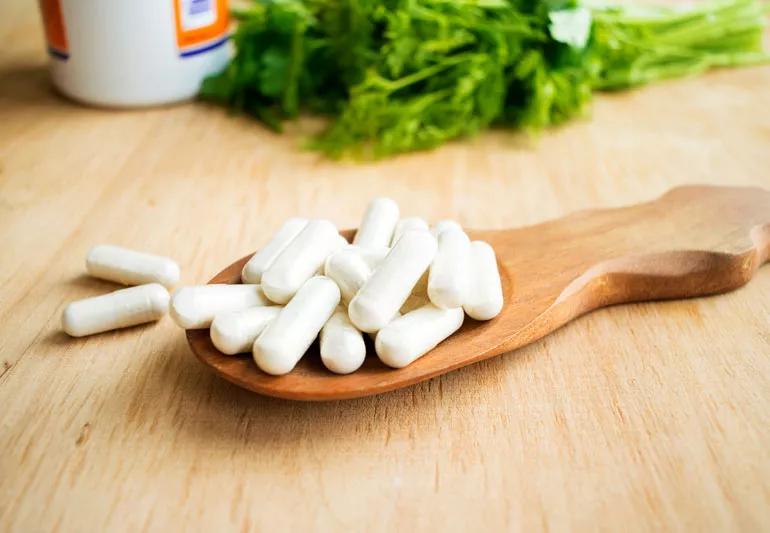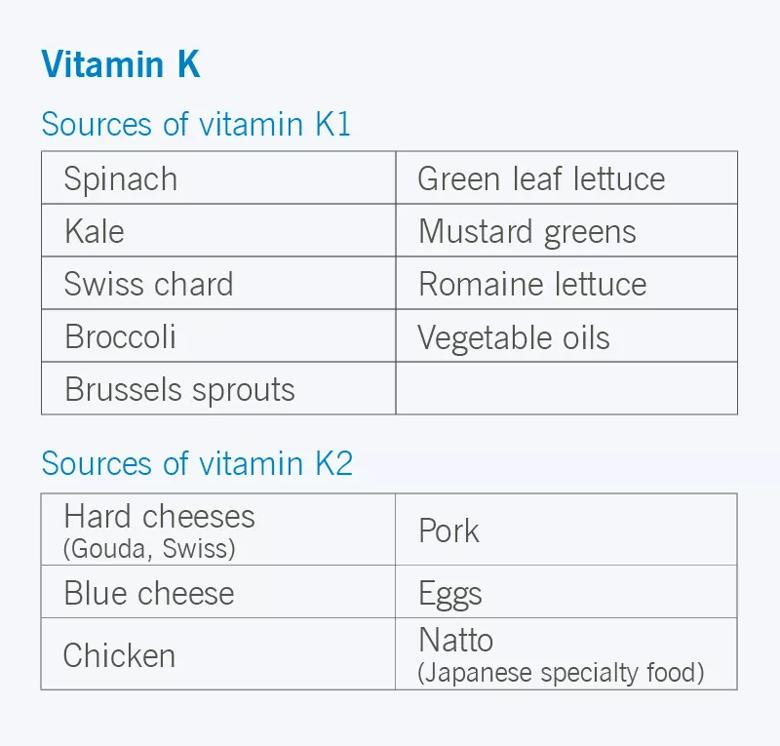Understanding the role of this vitamin (and where to find it!)

Image content: This image is available to view online.
View image online (https://assets.clevelandclinic.org/transform/5219b504-f0ee-4220-ab41-dc18817e7585/vitaminK-1031404622-770x553_jpg)
Vitamin K supplements in foreground with leafy veggies rich in vitamin K in background
You know your body needs calcium and vitamin D for strong, healthy bones. But do you know your bones also need vitamin K? And should you be taking a vitamin K supplement?
Advertisement
Cleveland Clinic is a non-profit academic medical center. Advertising on our site helps support our mission. We do not endorse non-Cleveland Clinic products or services. Policy
Vitamin K has long been known to play an important role in blood clotting. Recent research has focused on the influence of vitamin K in diseases such as heart disease, osteoporosis, diabetes and cancer. But let’s focus here on bone health.
“There is scientific rationale for looking at the association between vitamin K, bone density and fracture risk,” says rheumatologist Chad Deal, MD. Vitamin K activates proteins involved in bone formation and mineralization (a process that makes bones strong).
Vitamin K comes in two forms — K1 and K2. Vitamin K1 is found primarily in green, leafy and cruciferous vegetables. Vitamin K2, which is predominantly produced by bacteria, is further divided into subgroups named MK4 to MK13. Foods rich in vitamin K2 include some dairy products, pork, poultry and fermented foods.
Vitamin K2 may have more of a protective effect on bone than vitamin K1. However, deficiencies of both K1 and K2 appear to have a negative effect.

Image content: This image is available to view online.
View image online (https://assets.clevelandclinic.org/transform/e8bb1ada-2330-4cb5-b117-bfc34019270d/vitaminK-table-HEpost-1_jpg)
Several observational studies have found that inadequate intake of vitamin K is linked to low bone density and increased risk for fractures.
A study that analyzed data from the large Nurses’ Health Study found that women who consumed less than 109 micrograms (mcg) of vitamin K per day were more likely to break a hip.
Advertisement
A study of participants (both men and women) in the large Framingham Heart Study also showed a link between low vitamin K intake and increased risk of hip fractures. This study also showed an association between low dietary intake of vitamin K and low bone density in women.
An adequate intake of vitamin K is considered to be 120 mcg for men and 90 mcg for women. A true vitamin K deficiency, which is marked by an inability of blood to clot normally and easy bruising, is rare. “Most people can avoid a deficiency by getting enough vitamin K in their diet,” says Dr. Deal.
Based on the connection between vitamin K and bone health, several studies looked at whether it makes sense for anyone, including people with osteoporosis or at risk for it, to take vitamin K supplements. So far, results have been mixed.
Some studies, many of them conducted in Japan, found that supplementation with vitamin K1 or vitamin K2 improved bone mineral density, and few studies showed a decreased risk of bone fractures. Some subsequent studies found that vitamin K supplementation had no effect on bone mineral density. Many of the studies conducted thus far are limited by flaws in the design or a small number of participants.
Evidence to support vitamin K supplementation is too preliminary and contradictory to make recommendations. The U.S. Food and Drug Administration has not authorized a health claim.
“There is evidence for some positive effect, and there are ongoing studies,” says Dr. Deal.
Vitamin K supplements are relatively safe, and many people take them. People taking blood-thinning drugs, such as warfarin (Coumadin®), should not take vitamin K without consulting their doctor because vitamin K can reverse the effects of these drugs.
This article originally appeared in Cleveland Clinic Arthritis Advisor.
Advertisement

Sign up for our Health Essentials emails for expert guidance on nutrition, fitness, sleep, skin care and more.
Learn more about our editorial process.
Advertisement
It’s always best to talk to a healthcare provider before taking any supplements to avoid toxicity
From leafy greens to heart-healthy oils, the selection is abundant
Vitamin K2 foods aren’t the usual suspects
Vitamin K2 is gaining recognition for its effects on blood clotting, heart health and bone health
It helps your bones stay strong and your blood clot, but it may also do so much more
There are several vitamins and mineral supplements that many people can benefit from — but it’s important to consult with a healthcare provider before you start one
Protect and build muscle while getting essential amino acids and calcium with this protein
This essential mineral is key to healthy bones and teeth, but also plays other important roles
Type 2 diabetes isn’t inevitable with these dietary changes
Applying a hot or cold compress can help with pain
Pump up your iron intake with foods like tuna, tofu and turkey